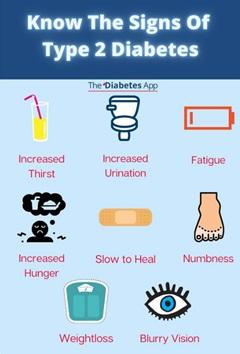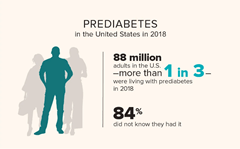Diabetes Prevention and Care Educational Programs
Diabetes Facts
Diabetes is a serious health condition in which your body doesn’t make enough insulin or can’t use it as well as it should. When this happens, too much sugar stays in your bloodstream, and over time, this can lead to serious health problems such as stroke, heart disease, vision loss, and kidney disease.
The truth is that 37 million, or 1 in 10, people in the U.S. have diabetes. However, 1 in 5 don’t even know they have diabetes. According to the ADA, diabetes is the seventh leading cause of death in the United States.
There isn’t a cure yet for diabetes, but eating healthy, losing weight, and being physically active can help you not only manage this condition, but also thrive.
If you have the following symptoms, you should see your doctor about testing your blood sugar:

- Frequent and urgent urination, often at night
- Extreme thirst
- Weight loss without trying
- Very hungry
- Blurry vision
- Numbness or tingling in the hands or feet
- Fatigue
- Very dry skin
- Sores that heal slowly
- Have more infections than usual
Understanding Hemoglobin A1C or HbA1c test
A hemoglobin A1C (HbA1c) is a simple blood test that is used to diagnose diabetes as well as to monitor how well your diabetes treatment is working overtime. It is also a critical step in an effective treatment plan. Only your doctor can tell you how often you need an HbA1c test, but typically, you will have an HbA1c test at least twice a year.
For most adults with diabetes, the goal is an A1c less than 7%.

Know your numbers
Proper self-care along with following the treatment plan prescribed by your doctor are the best ways to live a healthy life.
UMC’s Diabetes Self-Management program will give you the tools you need to help you manage your diabetes in your everyday life. This program will give you the support to manage diabetes in a way that works for you and your lifestyle.
Remember – You Have the Power to Control Your Diabetes!
What is Prediabetes?
Prediabetes is a medical term used for people whose blood sugar levels do not meet the established criteria for diabetes mellitus but are too high to be considered normal. Prediabetes puts you at increased risk of developing type 2 diabetes, heart disease, and stroke.

The CDC states that 88 million (1 in 3) adult Americans who develop type 2 diabetes nearly always have prediabetes, and more than 84% percent go undiagnosed.
If you have these risk factors, you may be at higher risk than others for prediabetes and type 2 diabetes.
- Are 45 year of age or older
- Are overweight
- Have a family history of type 2 diabetes
- Are physically active fewer than 3 times per week
- Ever had diabetes while pregnant (gestational diabetes)
- Gave birth to a baby that weighed more than 9 pounds
Think You Might Be at Risk?
Without intervention, many people with prediabetes could develop type 2 diabetes within 5 years, which puts them at risk of serious health problems, including:
- Heart attack
- Stroke
- Blindness
- Kidney failure
- Loss of toes, feet, or legs
Get Started Today to Prevent Type 2 Diabetes
The good news is that if you have prediabetes, our CDC-recognized lifestyle change program is one of the most effective ways to prevent getting type 2 diabetes. The program can help you lose weight, become more active, and prevent or delay type 2 diabetes.
Think you’re ready? Join today!
If you are interested in attending the Prevent T2 class, please click here.